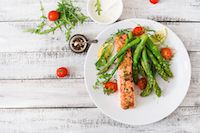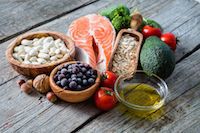What is a healthy diet?

A healthy diet is a way of eating that gives your body all the nutrients and energy it needs to function at its best. The word "diet" does not mean it is something temporary to help you lose weight. It refers to what you eat on a daily basis as a way of life!
What makes up a healthy diet?
Most healthy diets include
- lots of vegetables and fruits
- whole grains instead of refined grains
- healthy fats and protein from fish and plant sources
- low amounts of salt
- very few added sugars
A healthy diet includes whole, unprocessed foods that are closest to their original forms in nature. For example, it is better to eat an orange than to drink orange juice. Some good websites to look up the nutrient contents and health benefits of specific foods are NutritionData and Worlds Healthiest Foods.
Eat a plant-based diet as the foundation of your daily nutrition. This includes vegetables, fruits, legumes (beans and peas), grains, seeds and nuts. Aim to eat 4-5 servings of vegetables, 3-4 servings of fruits, and 3-5 servings of whole grains daily. This will give you lots of fiber which is very healthy for you! The daily protein requirements can be met with plant-based protein (e.g. green leafy vegetables, beans, soy products) as well as animal sources (e.g. seafood, meat, poultry, eggs).
Tips for eating healthy:

- Eat fresh food whenever possible.
- Half of your plate should be vegetables and/or fruit, 1/4 whole grains, and 1/4 protein.
- Healthy omega-3 fats reduce inflammation. This can include avocados, fatty fish (salmon, tuna, sardines), nuts (walnuts, pecans), and seeds (chia, flax).
- Cook and season with healthy oils, such as extra virgin olive oil or extra virgin coconut oil.
- Liven up your food with herbs, spices, garlic, and onions.
- Leafy greens provide a good source of calcium.
- Eat when you are hungry and stop just before you feel full.
- Drink lots of water and non-sweetened beverages like herbal tea.
- Limit alcohol to no more than 1 drink a day for women and 2 drinks a day for men.
What to avoid:
Read the nutrition label of the packages. If you cannot pronounce or do not recognize the ingredients, would you want to put that into your body? Try to eat fresh instead of canned food when you can.
Avoid the following:
- Fast food. Choose healthier options if you eat out.
- Refined carbohydrates (white sugar, white flour, candy)
- High fructose corn syrup (hidden in many foods)
- Sodas and sugary drinks. Try seltzer water flavored with fruit instead.
- Trans-saturated fats
- Too much salt
- Artificial sweeteners
- Artificial colors and preservatives
Do I need to buy organic?
Buying organic when you can will help reduce the load of pesticides, hormones, and chemicals you take in. You don't have to go all organic—even a little bit is a good idea! For fruits and vegetables, take a look at the "Dirty Dozen," which are the ones most important to buy organic when you can. Try buying organic dairy products and eggs.
Does healthy eating cost a lot of money?
You don't need to be rich to eat healthy. Fast foods and junk foods may be cheap and easy, but they can do a lot of harm to your body. Tips to save money:
- Buy produce that is in season.
- Buy from the bulk section.
- You can buy frozen produce as well, which retains as much nutrients as fresh.
- Buy things on sale. You can also freeze some items for later use.
- Plan your meals and shopping list.
- Cook large portions and portion them out for several meals for the week.
- Grow your own vegetable and herb garden.
Print Version
References/Resources
Ajala, O, et al. "Systematic Review and Meta-analysis of Different Dietary Approaches to the Management of Type 2 Diabetes." American Journal of Clinical Nutrition 97.3 (2013): 505-16. Web. 14 Nov. 2016.
Aune, D, et al. "Dairy products and the risk of type 2 diabetes: a systematic review and dose-response meta-analysis of cohort studies." American Journal of Clinical Nutrition 98.4 (2013): 1066-83. Web. 14 Nov. 2016.
Estruch, Ramon, et al. "Primary Prevention of Cardiovascular Disease with a Mediterranean Diet." New England Journal of Medicine 368.14 (2013): 1279-90. Web. 14 Nov. 2016.
Gardener, Hannah et al. "Mediterranean-Style Diet and Risk of Ischemic Stroke, Myocardial Infarction, and Vascular Death: The Northern Manhattan Study." The American Journal of Clinical Nutrition 94.6 (2011): 1458–64. PMC. Web. 14 Nov. 2016.
Gardener, Hannah et al. "Dietary Sodium and Risk of Stroke in the Northern Manhattan Study." Stroke; a Journal of Cerebral Circulation 43.5 (2012): 1200–05. PMC. Web. 14 Nov. 2016.
Lustig, R., et al. "Isocaloric fructose restriction and metabolic improvement in children with obesity and metabolic syndrome." Obesity 24.2 (2016): 453-60. Web. 14 Nov. 2016.
McEvoy, C., et al. "Vegetarian diets, low-meat diets and health: a review." Public Health Nutrition 15.12 (2012): 2287-94. Web. 14 Nov. 2016.
Micek-Galinat, Laura, and Siri Chand Khalsa. "The Anti-Inflammatory Diet." The Anti-Inflammatory Diet. Arizona Center for Integrative Medicine, 2016. Web. 14 Nov. 2016.
MyPlate. Digital image. Https://www.choosemyplate.gov/MyPlate. United States Department of Agriculture, 7 Jan. 2016. Web. 14 Nov. 2016.
Yang, M., et al. "Dairy intake after prostate cancer diagnosis in relation to disease-specific and total mortality." International Journal of Cancer 137.10 (2015): 2462-9. Web. 14 Nov. 2016.
Patient Education Materials
- Acupuncture
- ADHD
- Allergic Rhinitis
- Anxiety
- Aromatherapy
- Asthma
- Autism
- Back Pain
- Biofeedback Therapy/Training
- Breathing Techniques
- Cancer Symptoms
- Chiropractic
- Constipation
- Depression
- Diabetes
- Dyslipidemia
- Eczema
- Elimination Diet
- Fibromyalgia
- GERD
- Headache
- Healthy Weight / Obesity
- Heart Disease
- High Blood Pressure
- Inflammatory Bowel Disease
- Insomnia
- Irritable Bowel Syndrome (IBS)
- Massage Therapy
- Meditation
- Menopause
- Menstrual Disorders
- Osteoarthritis
- Physical Activity
- Probiotics
- Progressive Muscle Relaxation
- Rheumatoid Arthritis
- Supplements
- Tai Chi
- Yoga